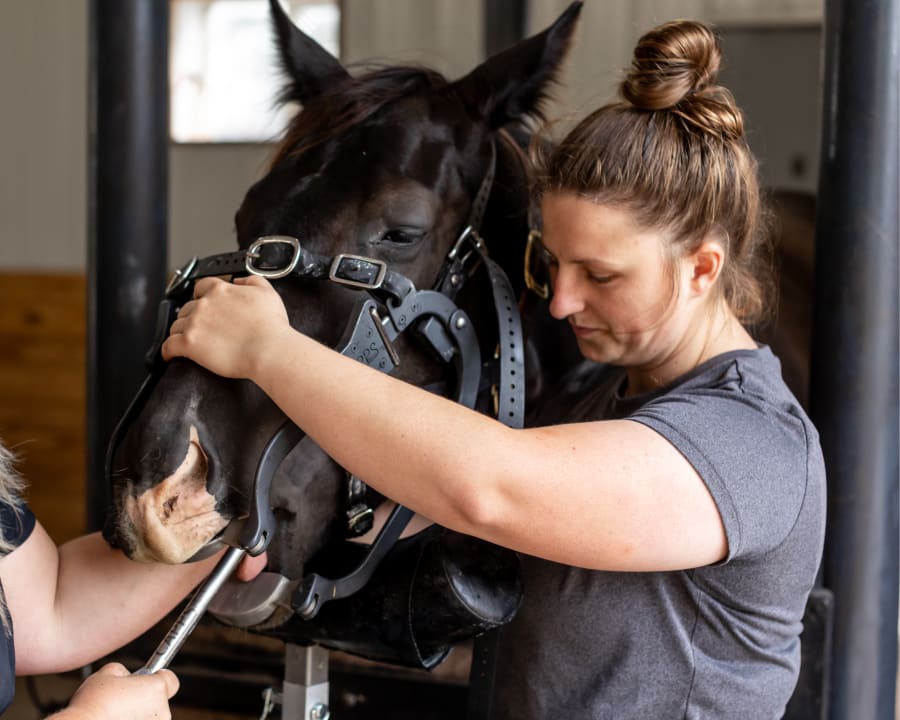Keeping Your Horse's Teeth Healthy
Horses can suffer from dental disorders that can impact their ability to eat and perform at optimal efficiency.
Horses should have their first dental exam and powerfloat at 2 years old followed by an annual exam every year after. Young horses that are growing, older horses over the age of 20, or those prone to dental issues may need to be seen more often. Sharp enamel points occur on most horses teeth over time due to uneven wear and grinding. Floating (filing or rasping) removes these sharp enamel points to prevent pain and ulcerations of the cheeks, gums, and tongue
With the advent of motorized dental equipment and the exciting advances in equine dentistry, veterinarians are now even better equipped to meet all of your horse’s dental needs.
Sedation and full-mouth speculums allow our veterinarians to perform thorough examinations and provide any necessary treatment, all while putting your horse's safety and comfort first.

Equine Dental Care & Exams
Our veterinarians can perform full equine dental services both at our facility and on your farm.
- Symptoms
If you notice any of the following symptoms in your horse, it's time for a dental appointment.
- Dropping feed
- Abnormal chewing motions while eating
- Head tossing while riding
- Weight loss
- “Quidding” or dropping wads of grass or hay
- Nasal discharge with a foul odor
- Poorly digested feed in manure
- Feed packing within cheeks
- Choke episode
- Assessment
An equine dental appointment starts with the veterinarian gathering a history of your horse.
An oral exam will be performed under sedation for both your horses comfort and to allow for an in-depth examination.
- Treatment
Horse's teeth can become worn in a way that leads to imbalances on the molar surface, sharp enamel points or abnormal incisor wear patterns. The treatment is a procedure called 'floating'.
During a powerfloat the veterinarian will use a float to grind the teeth in specific spots to either adjust the alignment of the mouth or to reduce sharp or protruding points in the teeth.
- Prevention
Providing your horse's diet from a feed pan on the ground is an excellent way to help them wear their teeth properly. When a horse lowers their head below the withers their lower jaw slides forward and facilitates front-to-back grinding in addition to their natural side-to-side chewing motion. If you have an older horse, they may require special attention with their diet, especially if they are missing teeth and struggle to break down long fiber. Fiber in the form of a soaked hay pellet offers a good solution in such cases but speak to your veterinarian about any concerns you may have.
FAQs About Horse Dental Care
- Why do horses need yearly dental exams?
Your horse's front teeth function to bite off forage, while the premolars and molars grind the feed so it can be digested. Horses have all of their permanent adult teeth by age 5. However, horses' teeth are constantly erupting throughout their lives. The silica and fiber in the horse's diet constantly wear the teeth down.
Problems may arise as the teeth wear. The teeth are slightly offset, which can lead to the development of sharp ridges, ramps, and hooks as the teeth erupt. If not addressed, these can lead to problems chewing and processing food and even weight loss. Improperly chewed feed can lead to choke and colic. Furthermore, any of the above-mentioned ridges, ramps, and hooks may affect your horse’s response to the bit.
As your horse ages, his or her teeth are constantly changing. Teeth should be checked for sharp points on at least an annual, but preferably a bi-annual, basis.
- What long-term problems can poor oral health potentially cause in my horse?
Serious dental conditions can develop, such as tooth root abscess extremely long hooks or overgrowths on the cheek teeth, and lost or fractured teeth. These conditions may require advanced dental care and/or extraction.
- How can I keep an eye on my horse's dental health?
We recommend an in-depth, sedated oral exam at least once a year in two-year-olds and older.
- How often do horses need their teeth floated?
The answer to this question will differ depending on your horse's age.
- Foals & Yearlings: Check teeth periodically for congenital abnormalities
- Yearlings: At their first complete dental exam
- 2-5 Years Old: Every six months
- 6-17 Years Old: At least once per year depending on wear patterns
- 17-20 Years Old: Annually
- 20+ Years Old: Annual exams, floating might not be necessary
New Patients Welcome
Stillwater Equine Veterinary Clinic is accepting new patients! Whether you bring your horse to our Stillwater hospital or we are providing mobile care, trust that we have the tools and skills to meet your horse's every need.
Contact
Hours
-
Click to View
- Monday:08:00 am - 04:30 pm
- Tuesday:08:00 am - 04:30 pm
- Wednesday:08:00 am - 04:30 pm
- Thursday:08:00 am - 04:30 pm
- Friday:08:00 am - 04:30 pm
- Saturday:08:00 am - 12:00 pm
- Sunday:Closed
